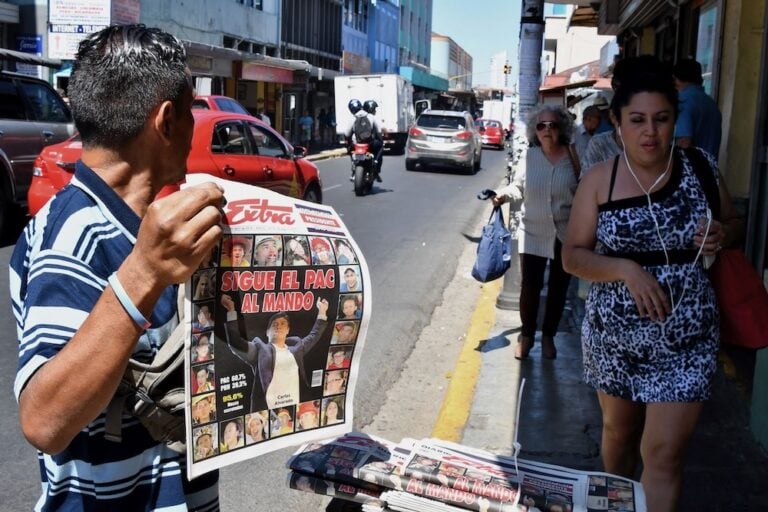(IAPA/IFEX) – The following is an IAPA press release: Inter-American Court of Human Rights decision on newsman, paper hailed MIAMI, Florida (September 14, 2001) – Today, the Inter American Press Association (IAPA) welcomed a ruling by the Inter-American Court of Human Rights calling on the Costa Rican government to reverse a decision to list journalist […]
(IAPA/IFEX) – The following is an IAPA press release:
Inter-American Court of Human Rights decision on newsman, paper hailed
MIAMI, Florida (September 14, 2001) – Today, the Inter American Press Association (IAPA) welcomed a ruling by the Inter-American Court of Human Rights calling on the Costa Rican government to reverse a decision to list journalist Mauricio Herrero Ulloa of the La Nacion newspaper in the official Registry of Convicted Felons following a defamation case.
IAPA President Danilo Arbilla sent letters to Costa Rican President Miguel Angel González and Supreme Court Chief Justice Luis Paulino Mora calling for the Central American country “to honor international treaties and commitments,” by complying with the Court of Human Rights’ request.
The defamation suit was filed by a Costa Rican former public official. The Supreme Court ruled against the journalist and his newspaper and ordered La Nacion to publish in full its decision and to remove from its online edition any reference to the matter that had led to the lawsuit. The complaint was filed by Félix Przedborski, a former honorary ambassador to the International Atomic Energy Organization in Vienna.
At issue were reports Ulloa published in the newspaper in May and December 1995, citing allegations which appeared in European media – including Le Soir Ilustré, La Libre Belgique and Der Spiegel – linking Przedborski with financial scandals. On November 12, 1999, the Supreme Court ruled that the European publications had failed to prove the truth of the allegations and therefore La Nacion should not have reprinted them.
Those found guilty of defamation and libel in Costa Rica are required to pay a fine and have their names recorded in the Registry of Convicted Felons.
The findings of the Court of Human Rights “give us a great deal of satisfaction, because the Supreme Court ruling against the journalist and the newspaper was contrary to any notion of justice and freedom of information and an assault on newsgathering and the people’s right to be informed,” said Arbilla, editor of the Montevideo, Uruguay, news weekly Búsqueda.
Earlier this year, the IAPA described the Supreme Court ruling as “excessive, disastrous, a negative precedent of censorship and an attack on the basic principles of freedom of expression.”


